Background
George Arthur Buttrick was born on March 23, 1892 in Seaham Harbour, Northumberland, England, the son of Tom Buttrick, an itinerant minister, and Jessie Lambert of Aberdeen, Scotland, a shop clerk at the time of her marriage.


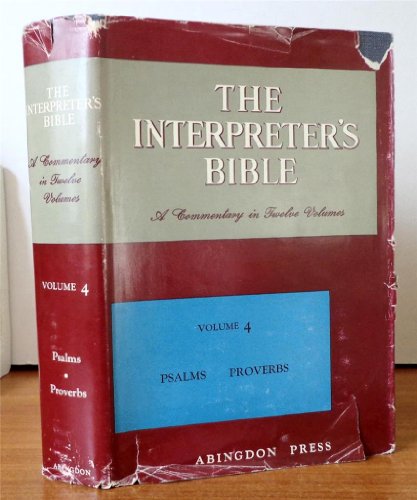
(Complete, understandable commentary includes: double text...)
Complete, understandable commentary includes: double text with RSV and KJV in parallel columns; exegesis, clarification of text meaning; exposition, application of text to today's needs; introductions with summaries of each book; general articles, indexes, maps, more! Abingdon.
https://www.amazon.com/Interpreters-Bible-Vol-Psalms-Proverbs/dp/0687192102?SubscriptionId=AKIAJRRWTH346WSPOAFQ&tag=prabook-20&linkCode=sp1&camp=2025&creative=165953&creativeASIN=0687192102
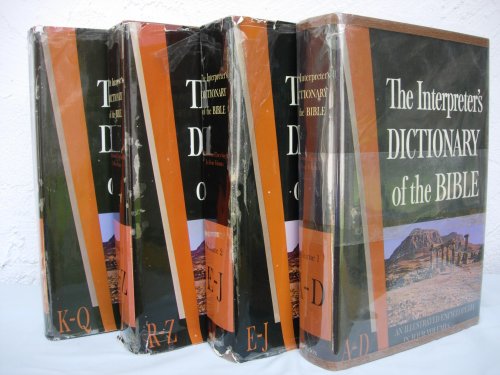
(New York / Nashville: Abingdon Press, 1962. Hardbound, ab...)
New York / Nashville: Abingdon Press, 1962. Hardbound, about 10.25 inches tall. Photo end papers with charts. Each volume includes a section of color plates, and is well illustrated in black and white with many maps and other pictures.
https://www.amazon.com/Interpreters-Dictionary-Bible-Illustrated-Encyclopedia/dp/B000LDS12K?SubscriptionId=AKIAJRRWTH346WSPOAFQ&tag=prabook-20&linkCode=sp1&camp=2025&creative=165953&creativeASIN=B000LDS12K
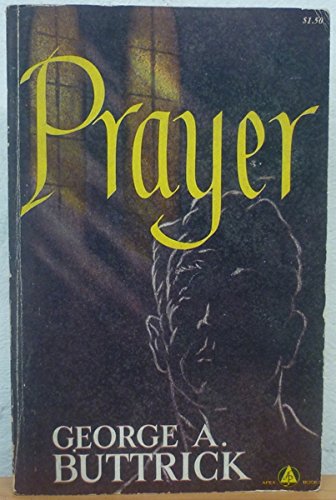
(George Arthur Buttrick (March 23, 1892 – January 23, 1980...)
George Arthur Buttrick (March 23, 1892 – January 23, 1980) was an English-born, American-based Christian preacher, author and lecturer. Buttrick served as a pastor in Quincy, Illinois, Rutland, Vermont, Buffalo, New York, and in 1927 he succeeded Henry Sloane Coffin as minister of the Madison Avenue Presbyterian Church in New York City.4 Buttrick gave a lecture series at Yale University. From 1955 to 1960 he was Plummer Professor of Christian Morals and Preacher to the University at Harvard University. He was then a guest professor at the Union Theological Seminary in the City of New York and went on to teach at Garrett–Evangelical Theological Seminary in Evanston, Illinois. He later taught at Davidson College in Davidson, North Carolina, Vanderbilt University in Nashville, Tennessee, and the Southern Baptist Seminary in Louisville, Kentucky.
https://www.amazon.com/Prayer-George-Arthur-Buttrick/dp/B0007DKYJC?SubscriptionId=AKIAJRRWTH346WSPOAFQ&tag=prabook-20&linkCode=sp1&camp=2025&creative=165953&creativeASIN=B0007DKYJC
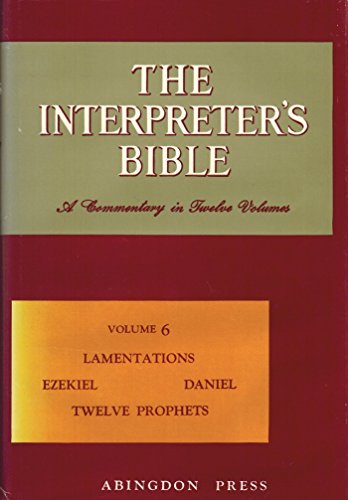
("THE INTERPRETER'S BIBLE says it all. Christians should r...)
"THE INTERPRETER'S BIBLE says it all. Christians should read this bible"
https://www.amazon.com/Interpreters-Lamentations-Ezekiel-Daniel-Prophets/dp/B000KNPRA0?SubscriptionId=AKIAJRRWTH346WSPOAFQ&tag=prabook-20&linkCode=sp1&camp=2025&creative=165953&creativeASIN=B000KNPRA0
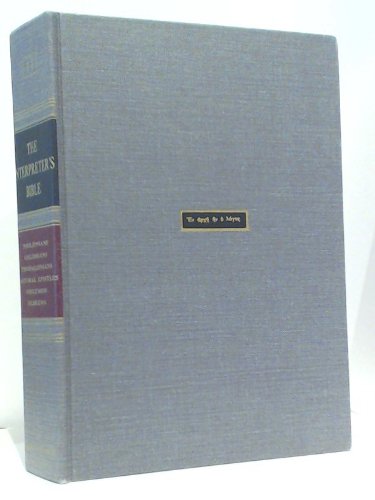
(The Interpreter's Bible (Volume 11) hardcover Buttrick, G...)
The Interpreter's Bible (Volume 11) hardcover Buttrick, George Arthur Jan 01, 1955
https://www.amazon.com/Interpreters-Bible-George-Arthur-Buttrick/dp/B0013E0WKK?SubscriptionId=AKIAJRRWTH346WSPOAFQ&tag=prabook-20&linkCode=sp1&camp=2025&creative=165953&creativeASIN=B0013E0WKK
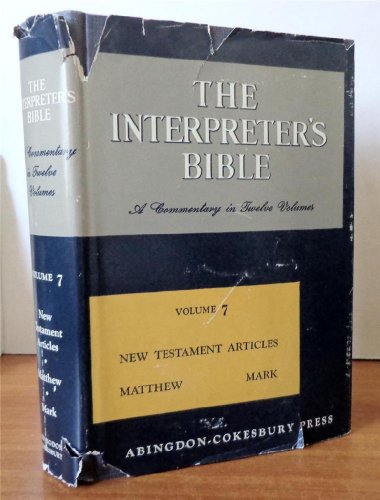
(This volume contains the complete commentary on the Gospe...)
This volume contains the complete commentary on the Gospels of Matthew and Mark. Almost every verse is packed with preaching and teaching opportunities, and the Expositions of this volume explore them to the fullest.
https://www.amazon.com/Interpreters-Bible-Vol-Testament-Articles/dp/0687192137?SubscriptionId=AKIAJRRWTH346WSPOAFQ&tag=prabook-20&linkCode=sp1&camp=2025&creative=165953&creativeASIN=0687192137
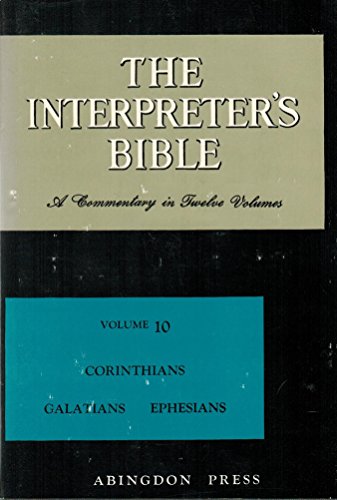
(The Interpreter's Bible: Volume 10 - Corinthians, Galatia...)
The Interpreter's Bible: Volume 10 - Corinthians, Galatians, Ephesians hardcover Buttrick, George Arthur - Editor Jan 01, 1953
https://www.amazon.com/Interpreters-Bible-Corinthians-Galatians-Ephesians/dp/B001VUBJBW?SubscriptionId=AKIAJRRWTH346WSPOAFQ&tag=prabook-20&linkCode=sp1&camp=2025&creative=165953&creativeASIN=B001VUBJBW
George Arthur Buttrick was born on March 23, 1892 in Seaham Harbour, Northumberland, England, the son of Tom Buttrick, an itinerant minister, and Jessie Lambert of Aberdeen, Scotland, a shop clerk at the time of her marriage.
Buttrick attended Lancaster Theological College in Manchester and Victoria University, graduating in 1915 with a degree in philosophy.
That same year George Buttrick visited the United States and stayed to be ordained as a minister in the Congregational Church. He became pastor of the First Union Congregational Church of Quincy, Illinois. Buttrick became a naturalized citizen of the United States in 1923. Following his pastorage in Quincy, Buttrick served churches in Rutland, Vermont, and Buffalo, New York.
In 1927 he became pastor of the Madison Avenue Presbyterian Church in New York City. In that pulpit from 1927 to 1954, he became known as a spokesman for many causes, which he advocated with conviction regardless of their public popularity. He was outspoken in his opposition to the fundamentalist theology so prevalent in the 1920's by insisting that "literal infallibility of Scripture is a fortress impossible to defend. "
As president of the Federal Council of Churches from 1939 to 1941, Buttrick visited Franklin Roosevelt at the White House to encourage the president in his attempts to restore peace after the German invasion of Poland.
In 1955, Buttrick became Preacher to the University at Harvard and Plummer Professor of Christian Morals in the Divinity School. After retirement from Harvard in 1960, Buttrick continued his career of teaching, writing, lecturing, and preaching at a number of other universities and seminaries.
Buttrick died on January 23, 1980 in Louisville, Kentucky, and was buried in Charlevoix, Michigan.
Throughout his lengthy public career Buttrick was known as a thoughtful, clear, and edifying preacher. A prolific writer, Buttrick wrote and published steadily from the beginning of his tenure at the Madison Avenue Church until almost the time of his death. His books are marked by erudition and a canny observation of daily life. His pragmatic application of Christian ideals makes all his books, even those from the 1920's and 1930's, readable today. Buttrick's most lasting contributions to theological scholarship are the twelve-volume commentary The Interpreter's Bible (1951) and the four-volume companion The Interpreter's Dictionary of the Bible (1962), both of which he edited. Although these works were compiled by nearly three hundred scholars from fifteen nations, the Buttrick stamp on them is clear. The commentary uses two sections to interpret the biblical text: one section is scholarly technical comment, and the other is astute application of biblical principles to everyday life, larded with allusions to and quotes from a wide range of sources in music and literature.
(Complete, understandable commentary includes: double text...)
(George Arthur Buttrick (March 23, 1892 – January 23, 1980...)
(The Interpreter's Bible: Volume 10 - Corinthians, Galatia...)
(The Interpreter's Bible (Volume 11) hardcover Buttrick, G...)
(This volume contains the complete commentary on the Gospe...)
(New York / Nashville: Abingdon Press, 1962. Hardbound, ab...)
("THE INTERPRETER'S BIBLE says it all. Christians should r...)
(Religion)
In his religious affiliation George Arthur Buttrick was Presbyterian and once served as a pastor of the Madison Avenue Presbyterian Church in New York City .
A pacifist, Buttrick strongly opposed American involvement in World War II. His opposition to the war was not political but was that of a consistent pacifist. After the war, Buttrick pointed out that Communist successes in China were largely attributable to the failures of Chiang Kai-shek and also stated that the arms race with the Soviet Union was a formula for mutual disaster.
Buttrick is perhaps best remembered as a scholar and an author, but he also had a profound influence on the thousands who heard him preach. Although he was associated with major universities and seminaries for much of his life, Buttrick was always a preacher first and foremost. His sermon content never took on the tone of abstract academic research but always dealt with the vital questions of applying the Christian faith to daily life. Listeners were impressed with his warmth and humility.
Buttrick assumed the good sense of his readers without patronizing them and employed a wide-ranging set of illustrations that evidenced sound common sense.
Quotes from others about the person
His sermons were described as having "gravity without mordancy, devotion without applied solemnity. "
One reviewer noted that he was "closer in mood and manner to the Fables of Aesop, the Canterbury tales of Chaucer, or the stories of Abraham Lincoln than to the careful allegories of the Rabbais or the elaborations of the Schoolmen. "
On June 27, 1916, Buttrick married Agnes Gardner; they had three children.
